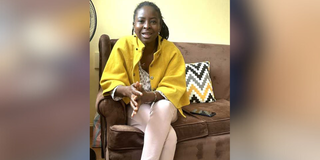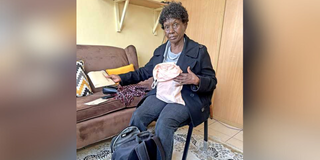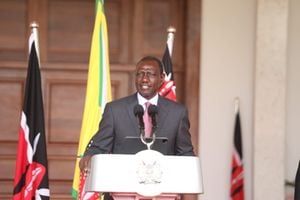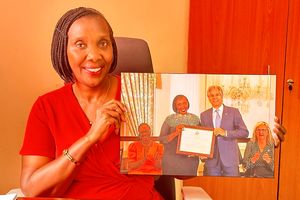
Mercy Njeru is a Kenyan woman who was trafficked into the Gulf.
In 2013, Mercy Njeru was just 19, fresh out of high school and had her whole life ahead of her.
Being from a humble family in Embu, Mercy already had a lot working against her and needed to do a delicate dance that would ensure further education without interrupting her younger brother’s schooling.
Read: Protect workers abroad
But life threw another curveball. Mercy’s mother died. Suddenly, a teenager whose life was just starting became the family matriarch.
Mercy’s younger brother had just joined Form One but the family had no money for fees or to fend for the two siblings and their sickly father. Their four older brother and sisters were married but also lived in abject poverty. Mercy met a friend who had travelled to Saudi Arabia for employment.
“She told me about the requirements and linked me up with the agent who initiated the recruitment process and asked me to travel to the city. One of my married sisters got a loan to partly pay our younger brother’s fees. She invited me to come to Nairobi to work and pay for my trip,” she recalls.
The teenager did not know, but that was the start of an unforgiving slavery ordeal, but also thrust Mercy into a purposeful place, saving many women who get lured into a dog’s life under the guise of employment.
As the world celebrated the anti-human trafficking day on July 30, survivors and victims narrated their horrendous experiences at the hands of captors and employers.
The United Nations Office on Drugs and Crime (UNODC) says that most victims, mostly women and children, are trafficked for forced labour, sexual exploitation and domestic servitude. Glory Ndaka, the UNODC representative in Kenya, reveals that thousands of individuals are trafficked annually, mainly from rural areas.
“In East Africa, 80 per cent of victims are trafficked for forced labour. While the exact numbers can be challenging, available data indicates that women and children are disproportionately affected and particularly vulnerable,” she offers.
After getting a passport, Mercy was asked to choose between Lebanon, Saudi Arabia, Jordan and Qatar. She chose Qatar. On the travel date, she met five other girls travelling to Qatar.
All the documents she signed to enable her travel were in Arabic. On arrival at the Jomo Kenyatta International Airport (JKIA), her ticket bore two destinations – Abu Dhabi and Jordan. The agent assured Mercy that that did not present any problem.
In Jordan, they were abandoned at the airport for two days without food. Kenyans working at the Jordanian airport called the agent, to link the stranded women to the employers’ office.
The five women still stayed in an office for over a week before four of them were taken up by their employers. Mercy stayed at the office for another week before her employer picked her up.
Three months later, Mercy fell seriously ill but was not taken to hospital. The employer insisted she work until she can pay travel expenses back to Kenya. A month later, she was taken to the airport and returned home. Shortly after, Mercy asked the same agent for another opportunity but was turned down. Another agent arranged to have her work as a cleaner in an airport in Qatar. Again, the air ticket had two destinations.
On arrival at Qatari airport, Mercy was told that she was in transit to Lebanon to work as a house-help. A week later, her biometrics were taken before being shipped to Lebanon.
The employment agent told Mercy that she should have declined the job before leaving Kenya. Mercy worked for a woman who lived with her mother, two brothers, two sons and two nephews. She would wake up at 4am and work until 1 am, taking only a little black tea, a slice of cheese and a toast of bread during the long working hours.
Because of the insufficient and unbalanced diet, Mercy constantly fell sick. The employer said any extra food would be deducted from Mercy’s pay. One day, her employer’s children were playing on the balcony despite being warned against it.
The angry employer grabbed Mercy, intending to throw her off the building. In the ensuing struggle, the employer called police and reported that Mercy had attempted to throw her down. The emaciated Mercy was arrested and detained for three days.
Mercy’s employer had ransacked her belongings and confiscated all travel documents. From then, she worked without food, showering or sleep – she was now a slave. One night, Mercy escaped but saw a police roadblock and returned. In the next attempt, Mercy left at 3am and walked for an hour.
A sympathetic taxi driver who noticed her desperation offered to take her to a red-light district with mostly African prostitutes. A Senegalese girl hosted Mercy for some days.
Officials at a government consulate allegedly advised Mercy to work as a prostitute and save up for processing of travel documents. A Kenyan working as a prostitute told Mercy to either join the trade or find another way to make money for sustenance.
Now weighing just 40kgs, Mercy offered to take the money and left with the man. In the house, Mercy told the client she needed to go buy condoms, but instead left.
She slept under a bridge for a week, eating only tea and scones from a tea vendor she befriended. A man who often drove past the bridge had a conversation with Mercy and offered her employment and accommodation in his apartment, where he also hosted other African women in a similar predicament.
He bought her clothes and said he would deduct the cost from her salary. The other girls gradually moved out to their own house, eventually leaving only Mercy.
The host proposed marrying Mercy, who reluctantly agreed to live as his wife when he threatened to kick her back to the streets. He sexually abused her, and three months later Mercy was pregnant and the man stopped talking to her. Owing to depression, she twice attempted suicide and was hospitalised for two months. After giving birth, Mercy neglected the baby and didn’t breastfeed for days. Eventually, she started caring for the child.
Two months later, a Sierra Leonean friend reached out and informed Mercy of a protest by Kenyans outside their consulate, demanding assistance to get back home. She joined the protest and registered to get travelling documents. But her baby’s father snatched the child and disappeared. It was then that a UN lawyer who Mercy had earlier met, contacted Lebanese police. The man assaulted Mercy and confiscated her phone.
Mercy’s Sierra Leonean friend called the lawyer who, through police supervision, got the man to sign release documents for the baby. She now assists other human trafficking victims through Awareness Against Human Trafficking (HAART).
Mercy says that most trafficking victims blame themselves for whatever happens to them. HAART’s Head of Protection, Mercy Otieno, says they have assisted many victims using UN’s pillars of protection, prevention, prosecution and partnerships.
“We provide assistance for both Kenyan and non-Kenyan victims of human trafficking. We initially provide immediate needs like shelter, food, clothing, rent and medical care but go further to get legal aid in instances of civil or criminal cases. We also offer training to the criminal justice system actors who pursue these cases,” the HAART head of protection says.
One victim said that unemployment and cost of living is what lures people into that slavery. In 2000, mother-of-two Mary Muruoki, lured by a friend with a mouthwatering job offer, left the country by bus through Tanzania to South Africa.
For 20 years, the traffickers preyed on her illiteracy and innocence to ferry her from one African country to another and eventually to the Middle East.

Mary Muruoki is a Kenyan woman who was trafficked into slavery in the Gulf.
Today, Mary has saved over 400 women previously in prison and captivity, back to their countries. Mary was enslaved for 20 years.
At one time, she worked for five years without pay and shared sleeping quarters with dogs. Today, the woman who had never gone to school is a good English speaker with accolades from Jordan, Uganda, Kenya and other countries.
She is a prevention coordinator at Awareness Against Human Trafficking (HAART), an NGO assisting victims and survivors of human trafficking. In 2000, sympathetic truck drivers helped smuggle Mary into South Africa.
“I was hidden in luggage by a truck driver to cross into South Africa from Botswana. The heavy luggage would fall on me but it was the only way. But when I entered into South Africa, my friend who had invited me couldn’t be reached however much I tried contacting her. I stayed at a hotel in South Africa for three days before the staff linked me up to an Afrikaans woman who offered me employment. This was the beginning of my 20-year-long nightmare,” Mary recalls.
Mary’s first employer confiscated her passport and never allowed her to leave the house, not even for sunshine. She worked from 4am to 1am and only briefly slept with the dogs. She got little food and no salary. Attempts to resist humiliation and torture only resulted in further suffering for the first five years. She faked humility to earn the employer’s trust.
“She started treating me better and even now allowed me for the first time in five years to go outside and walk the dogs. I was very thin and the dogs were huge, so I had to tie the leashes around my waist to handle the canines. I would walk them daily between 3pm and 4pm for three months before a man who used to meet me started talking to me,” Mary narrates.
The man suggested she escape. One day after walking the dogs, she escaped and followed the stranger. The man, a pastor, took Mary home, and advised her to process new travel documents with the United Nations High Commission for Refugees (UNHCR).
After filing what she thought were travel documents, Mary was told she had to go to Jordan where the Kenyan embassy would help get her home.
At the Jordan airport, a woman holding a placard with Mary’s name took her to a rich woman’s home. Mary had been tricked into working as a house-help there. She was not allowed to even get near the humongous villa’s doors. No pay and little food, again.
Mary stayed captive in the house for five years until her captor fell sick and went to hospital for an operation for two weeks. One day when Mary was asked to let visitors in, she made a run for it as her employer screamed.
Read: Leah's journey from Dubai, Joyce's rise from Mukuru: Two domestic workers and their remarkable tales
Mary walked through snow for an hour and collapsed in a church compound. A guard called an Ethiopian Nun Immaculate, rescued her and housed her for nine months. Meanwhile, Mary had developed spinal complications and was hospitalised for nine months.
In 2016, the monastery that had rescued her provided a house outside where she started going to church and met Africans. During that time, she housed 10 Kenyan women who had fallen out with their employers, using her little savings to help them get back home.
Kenyan consulate officials often said they could not help victims get back home. Mary contacted the Kenyan ambassador in Egypt, who travelled to Jordan. The ambassador rented a hall and bought mattresses for the women left behind. Along the way, Mary met an American woman working for Set Captive Free organisation. A Jordanian military official also joined the organisation to help human trafficking victims.
Now known as Mama Mary, she has received accolades from many countries and has been a guest speaker in anti-human trafficking forums. Recently, the Kenyan embassy in Thailand facilitated the repatriation of 30 Africans who had been trafficked to Laos.
Kenya’s Counter Trafficking In Persons (CTIP) has increased efforts in combatting human trafficking. The government has also developed guidelines through the National Assistance Trust Fund for Assisting Victims of Trafficking to help victims in Gulf states.









